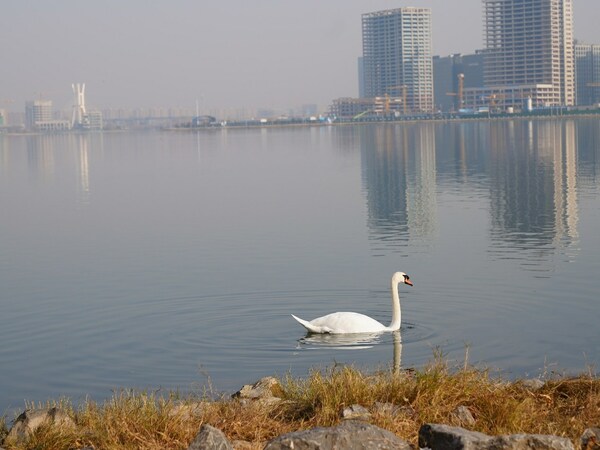ZHENGZHOU, China, Dec. 20, 2023 /PRNewswire/ — A report from Science and Technology Daily: Visit the Zhengzhou Longhu Park in Henan’s capital city Zhengzhou and you will be greeted by majestic swans and other wildlife. It is difficult to believe that this place used to be a wasteland once.
Henan’s commitment to a greener urban environment can be seen from its multiple initiatives that combine environmental protection with economic benefits.
The ecological protection drives in this inland central province in the Yellow River valley are tackling alleviating extreme climate conditions and poverty in its suburban cities while building up foundations for their economic growth.
The Zhengzhou Longhu Park at the heart of Zhengzhou is a striking example. The size of nearly two dozen soccer fields, it is the largest artificial wetland in Zhengzhou with natural water ecosystem protection and restoration functions. Once a barren wasteland, it was transformed in merely 10 years into a haven for nearly 150 species of wildlife such as mute swans, egrets, ducks and mandarin ducks.

A mute swan is swimming in the lake of the Zhengzhou Longhu Park. (Photo taken by WANG Xiaolong/S&T Daily)
There are 55 mute swans in the park. Lu Bing, a volunteer with an association for bird protection in Zhengzhou, says the species is very choosy about its habitat but the Longhu Park has been meticulously protected and greened to meet its needs.
The conservation model in the wetland park involves both the government and volunteers. The Zhengzhou municipal government, working with local animal protection experts, has planted vegetation suitable for the consumption of the mute swans in the park. “This not only creates a scenic attraction for visitors, beautifying the natural environment but also ensures ample food for these swans to thrive on,” Lu said.
Besides, the park’s water and air quality are monitored regularly in real-time while portable noise monitoring devices are used to periodically assess the noise levels.
Another highlight of Henan’s environmental protection drive is the national-level wetland park in Yuzhou, a county in Xuchang City, which showcases an innovative model of treating polluted water.
A management personnel of the wetland said wetlands constructed adjacent to a sewage plant could naturally purify wastewater.
The wetland microbial community helps remove pollutants from wastewater by catalyzing chemical reactions, biodegradation and biosorption. They also support vegetation growth. The water passes through the surface flow wetland and its quality is further improved. It is then discharged into the nearby river, meeting discharge standards.
The wetland system also serves as a green lung and a sight for sore eyes for the nearby residents. “The plants remain green throughout the year except in winter, and people enjoy bringing their families here to see the beautiful scenery,” a passerby told Science & Technology Daily’s reporters.
Both the Zhengzhou Longhu Park and the Yuzhou Wetland Park exemplify the vision of providing a healthy living environment for the local people. Besides, it focuses on creating an integrated model that utilizes a clean environment to boost the economy.
For example, Sunzhuang, a village in Zhengzhou close to the Yellow River, has been hosting seed technology expos for several years.
The latest exhibition in October this year showcased over 6,500 new vegetable varieties. The participants included top breeding teams from 31 provinces, municipalities, and autonomous regions across the country, as well as from the Hong Kong, Macao and Taiwan regions. International and foreign-funded enterprises such as Syngenta, Nunhems, Rijk Zwaan, Enza and Hazera were also present.
“The seed expo provides a platform for displaying newly developed vegetable varieties. In the future, we will strengthen cooperation with research institutions and enterprises, promote new and superior varieties, and contribute to rural revitalization,” Jiang Junping, director of the seed tech expo, said.















